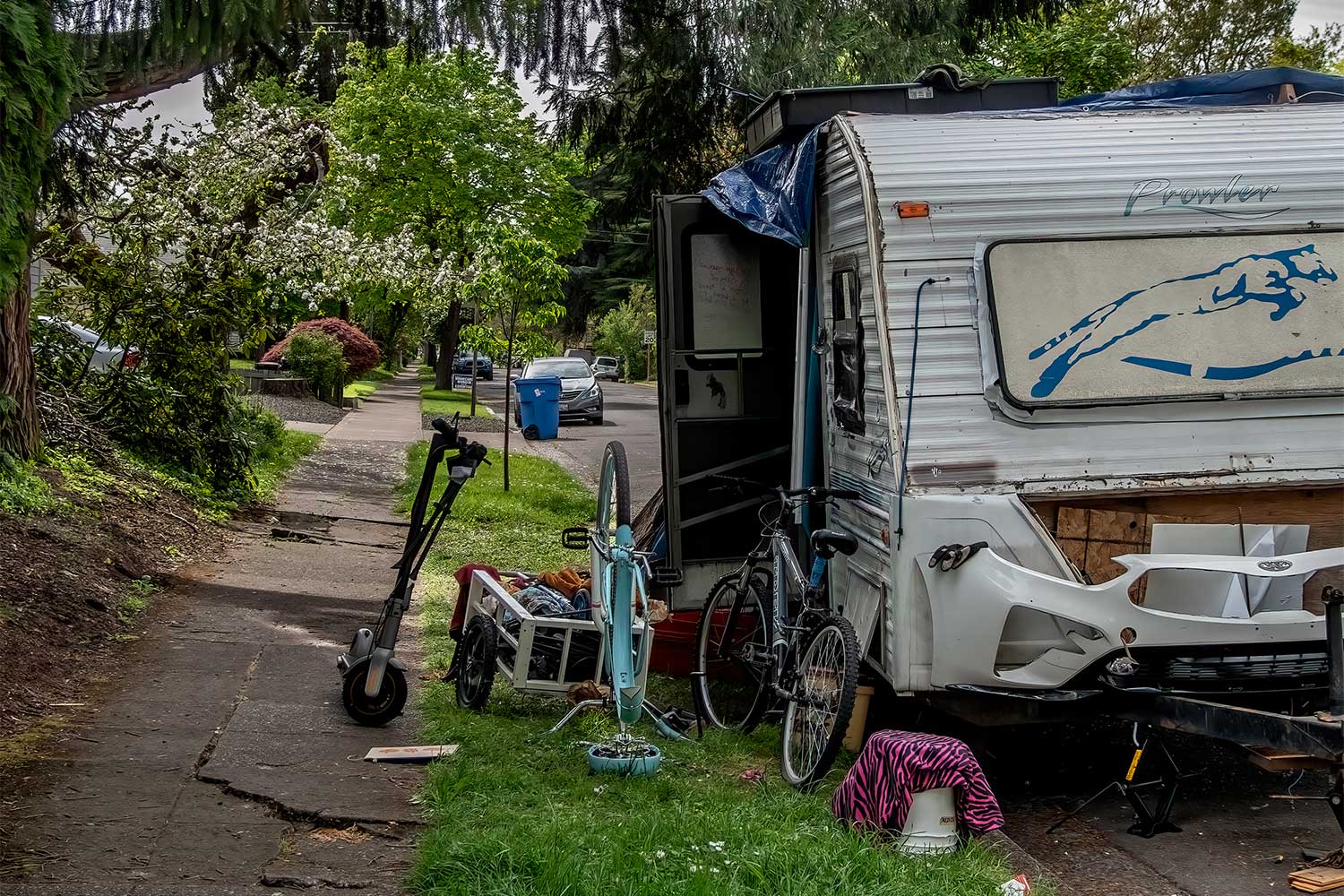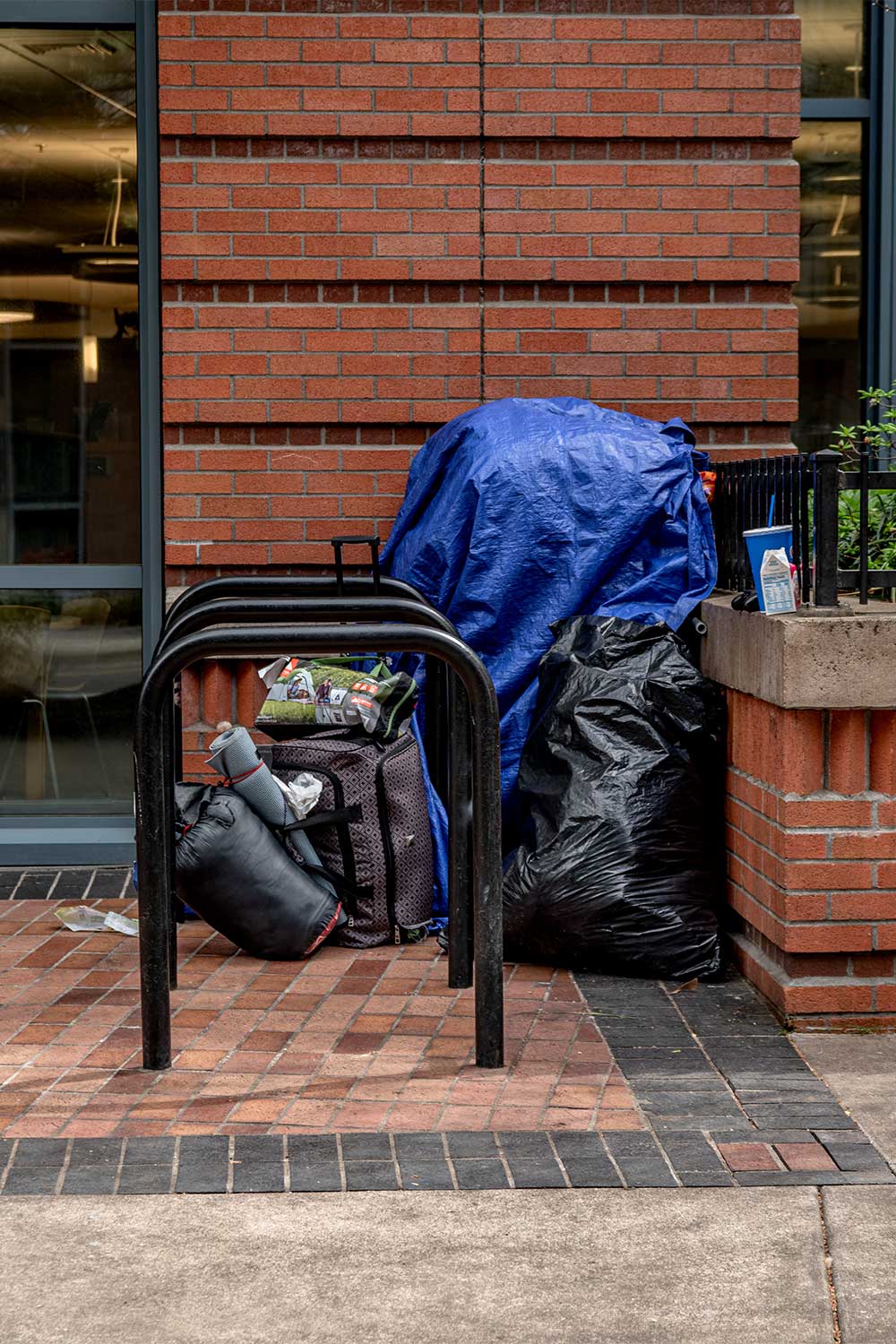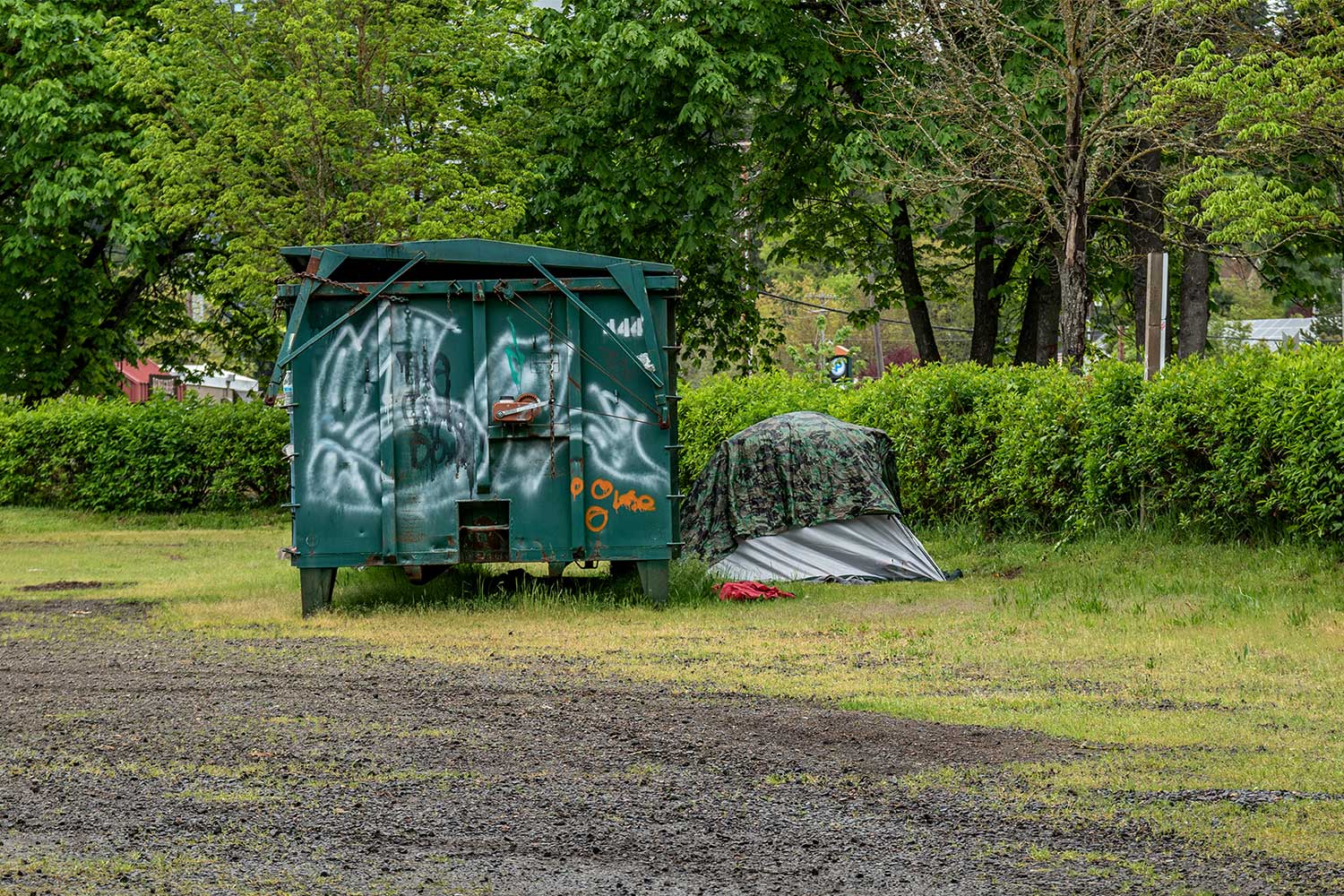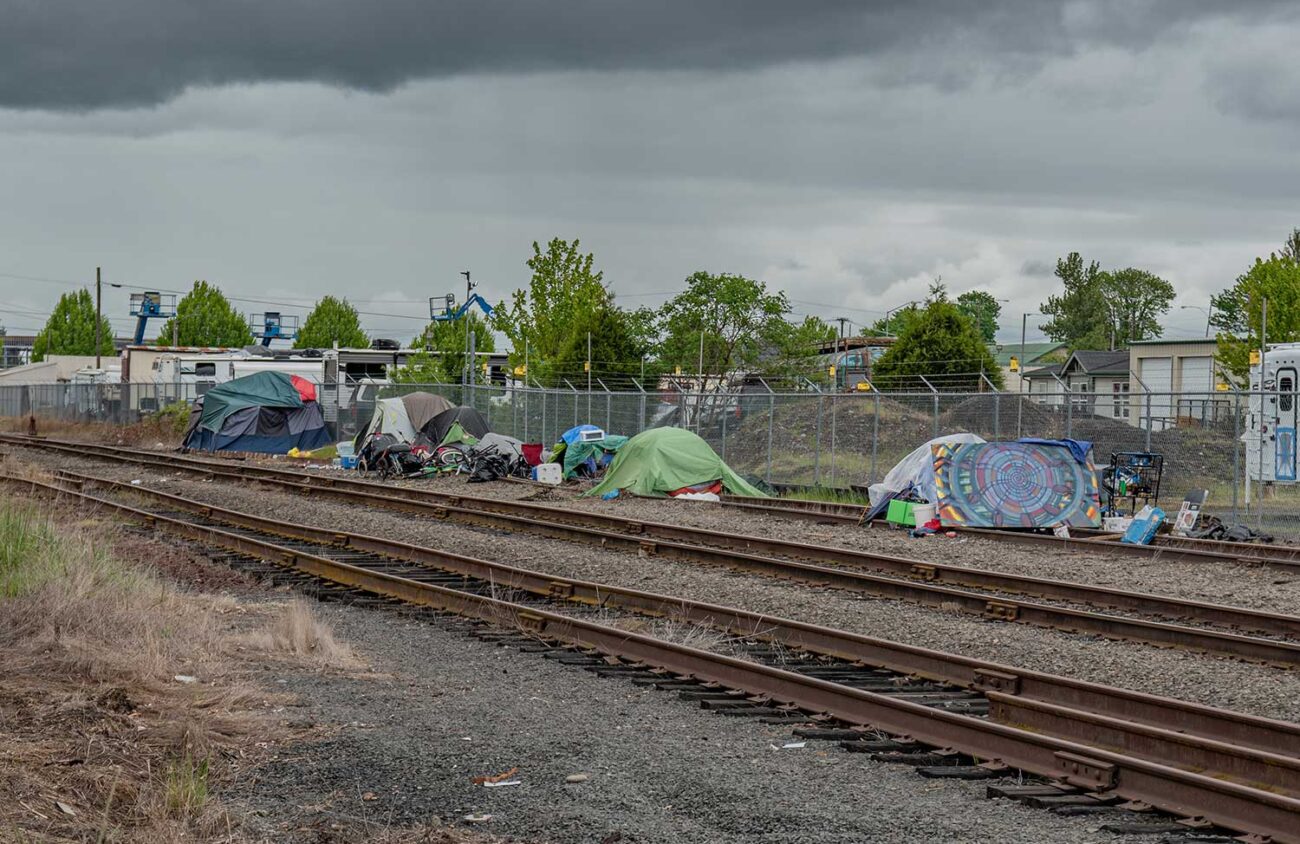By Bentley Freeman, Alexis Weisend and Evan Weston
In 2021, Oregon lawmakers passed a new law directing cities to stop the arbitrary way they treated unhoused people who camp on public property.
The law is intended to compel Oregon cities to comply with two U.S. Court of Appeals rulings that say criminalizing the homeless for sleeping or camping in public can be a violation of their civil rights.
Oregon cities have until July 1 to write “objectively reasonable” rules determining where unhoused people may sit, sleep or keep warm and dry outdoors on public property when they have nowhere else to go.
“This bill will ensure that individuals experiencing homelessness are protected from fines or arrest for sleeping or camping on public property when there are no other options,” Gov. Tina Kotek, then the Oregon House speaker, said in support of the measure.
The Eugene City Council is racing to meet the deadline and will hold a public hearing May 15 about its proposed new anti-camping rules.
But a close examination of the proposed rules raises questions about whether the City Council is running counter to the law’s intentions.
Rather than clarify the rules, advocates for unhoused people say, the City Council’s proposed changes will make the city’s anti-camping rules more convoluted than before. City officials say they will not provide a map that shows where unhoused people can camp.
And rather than lift the threat of punishment, the proposed rules intensify the city’s criminalization of the homeless. People violating the new anti-camping rules in some cases could see steeper fines and — in a new twist — face jail time.
Heather Marek, an attorney with Oregon Law Center who represents people experiencing homelessness, says the city’s changes will pair more complicated anti-camping rules with bigger penalties, inviting more punishment for the unhoused.
“For people who are confused, the stakes are even higher and more punitive,” Marek says.
Enlarge

Steve Alberts, 60, says he has lived unhoused in and around Eugene for the last 16 years. He says he’s concerned the changes will make the situation more complicated for unhoused people.
“Where do you think the people are gonna go next?” Alberts says. “They’re gonna find another place to sit down, lay their head down and rest.”
The law seeks to bring Oregon cities into compliance with two U.S. Court of Appeals rulings, Martin v. City of Boise and Blake v. Grants Pass, that held that criminalizing unhoused people for camping on public property when they have no place else to go violates their Eighth Amendment protections. The Eighth Amendment protects against imposing excessive fines, as well as cruel and unusual punishment.
City Attorney Kathryn Brotherton, who is central to the crafting of Eugene’s new anti-camping rules, declined to be interviewed for this story.
One proposed change in the city code seeks to differentiate between someone setting up a camp and someone simply trying to find a place to sleep on public property.
According to the city’s proposed amendments, Eugene would eliminate prohibitions about using sleeping bags or other bedding material. Instead, the city would narrow its definition of camping on public property to using a tent, tarp, lean-to, shack, wooden pallet or any other temporary shelter.
It’s the description of where unhoused people would be prohibited to camp that’s causing the most confusion.
Eugene’s current code prohibits camping on any “sidewalk, street, alley, lane, public right-of-way, park or any other publicly-owned property or under any bridge or viaduct.”
Enlarge

The proposed change does away with that list and replaces it with a series of rules that, in effect, maintain the current camping prohibitions. Under the proposed changes, camping would be banned on public property:
• Within 1,000 feet of any school or any building used as an education facility. That includes any public or private school buildings, University of Oregon facilities and public libraries.
• Within 100 feet of the Willamette River and all other open waterways.
• Within five feet of vehicular traffic.
• On sidewalks if the tents and other structures fail to leave a pathway of at least four feet.
• On shared-use paths if the camps do not leave at least a pathway at least 10 feet wide.
• All property meant for use by motor vehicles, including streets, parking spaces and publicly owned parking lots.
During an April 24 work session on amending the city’s ordinance on prohibited camping and sleeping, city councilors noted that the long list of new prohibitions does almost nothing to describe where unhoused people would be allowed to camp.
Councilor Lyndsie Leech and other council members have asked the city to provide a map as to where camping would be allowed.
“I wanted a map so that we can say assuredly that there are sufficient places for the thousands of people in our city that are unhoused, recognizing that we only have about half of what is needed in emergency shelter space, and a way to let people know that they won’t be arrested for sleeping within the guidelines of the ordinance,” Leech says in an email to Eugene Weekly.
There’s no evidence the city intends to provide any such help.
During the April 24 work session, City Attorney Brotherton said it would be a “technical impossibility” to create a map because the city would have to locate and measure all areas like sidewalks and planting strips in Eugene.
Leech asked if larger areas where people can legally camp could be mapped out.
City staff opposed the idea. “You’re essentially establishing a rest stop without any resources or any actual intention of this is where we want people to camp as opposed to here’s where you could possibly camp,” City Manager Sarah Medary said.
As it turns out, providing such a map is not impossible. The city of Bend is following a similar concept to Eugene’s but has mapped sections of the city where camping is prohibited.
Councilor Alan Zelenka said he didn’t like the idea of a map because “it would be perceived as these are sanctioned places where people can camp.”
Councilor Jennifer Yeh said she understood the hesitation about a map.
“But it also sounds a little bit like security through obscurity, like pretending like people won’t figure out where these spots are seems a little naive,” Yeh said. “And that if we just keep them to ourselves, we’re somehow making things better.”
Instead, city officials expect unhoused people to figure out all the “technical impossibility” of the new rules on their own.
“In theory, this ordinance would allow people to [camp] in places that aren’t covered. But if you look at what it enumerates, it’s unclear where that would be,” Marek says.
Marek notes that the rules for camping on sidewalks require a four-foot wide path — but that average sidewalks and planting strips in Eugene tend to be between five and six feet in width.
“So, you know, as long as the person could keep themselves confined to about a foot of width, it would be OK,” Marek says.
Federal judges who ruled cities’ anti-camping rules could be unconstitutional specifically criticized the efforts of cities to criminalize the basic human need to sleep and find shelter. Most of the plaintiffs in Martin v. Boise served time in jail for violating the city of Boise’s camping ordinance.
“[O]rdinances criminalizing sleeping in public places were never a viable solution to the homelessness problem,” Judge Marsha Berzon of the U.S. 9th Circuit Court of Appeals wrote in the Martin case. “People with no place to live will sleep outside if they have no alternative. Taking them to jail for a few days is both unconstitutional, for the reasons discussed in the opinion, and, in all likelihood, pointless.”
But the city’s proposed rules changes increase the punishment for unhoused people who break anti-camping rules. People who are caught illegally camping twice in 30 days would be considered in “willful” violation. The fine would increase from $200 to $500 and the unhoused person could face up to 10 days in jail.
Eugene Police Department Chief Chris Skinner said that during the April 24 work session that there are not enough beds in the Lane County jail to start putting unhoused people behind bars for camping.
“The challenge is the system,” he said. “And we’ve talked about the system for a long time. The system is not a robust system to handle any kind of accountability mechanism absent of paying fines.”
City councilors wonder if jail time is an empty threat.
Enlarge

“We’re not gonna put anybody in jail for this,” Zelenka said during the work session. “So that’s kind of a hollow part of this. And I guess the other part is giving and placing a fine on a person who has no income and has no ability to pay has no real effect.”
Marek says many of her clients have court debts after being cited for sleeping outside.
“That affects their credit, and their criminal records make it hard for them to get housing. It also leads to employment discrimination,” she says. “And so it just makes it harder for people to get out of these situations.”
During the April 24 work session, Brotherton said people who violate the city’s anti-camping rules can seek to have their charges and fines dismissed through community court.
“The likelihood a person will be a ‘repeat offender’ and further compound the cards already stacked against them is high so long as our city focuses more efforts and funding police and criminalizing people over community support and housing first solutions,” Bridgette Butler, outreach coordinator for Black Thistle Street Aid, says in an email to EW.
Black Thistle provides medical care to unhoused people free of charge. The organization hosts a pop-up medical clinic every second Wednesday of the month at the Washington Jefferson Park horseshoe pits.
“Arresting a person and placing them in jail for crimes related to survival is a waste of taxpayer dollars and does nothing to solve the reason a person was sleeping/camping/trespassing in the first place,” Butler says.
Odessa McBride, 24, spoke about the proposed changes outside of her trailer, parked in downtown Eugene, where she had been living for two weeks. She says she’s lived unhoused in Eugene for eight years.
When asked about a potential map outlining where it is legal to camp, McBride says, “I feel like that would help significantly for not only myself but for my friends.”
McBride says she was issued a notice of removal by Eugene Parking Services and was scheduled to have her trailer hauled away the next day.
“I feel like people don’t know where it’s legal and where it’s not legal to camp,” McBride says. “Because of that, I’m always in motion.”
